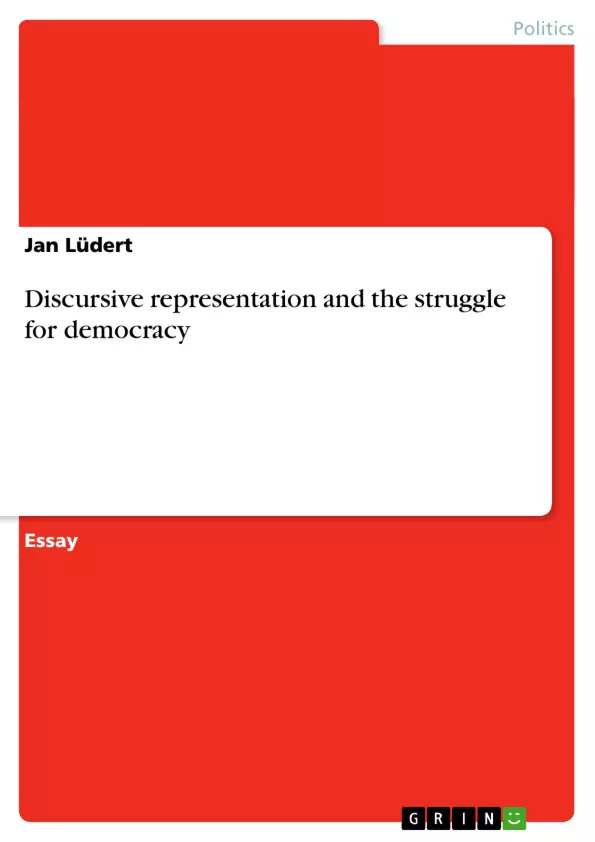The World Trade Organization (WTO) has become the guardian angel of trade
liberalisation, but its growing global power especially after the 1999 Seattle debacle
has engendered growing public scrutiny.2 A number of scholars, activists and critics
are concerned with the democratic deficit in system-level institutions, in particular the
WTO, and are searching for solutions and alternatives to promote democratic
legitimacy an accountability in global institutions.3 In this modern era of globalisation
and democracy, in which the forces of a globalised economy constrain and elude the
control of the nation state and its populus, a crucial question comes to the fore4: Can
democracy in its present form, as bounded to territorial and sovereign states, address
the increasing transnationalisation of society or is there a need to advocate a new
pillar of democratic interaction more suitable to counteract real existing globalisation
and its proponents?
This
Inhaltsverzeichnis (Table of Contents)
- WTO Democracy theory and practice
- The WTO: "Member Driven" and Democratic?
- Decision-making processes and the democratic deficit
- Discursive Representation and the WTO
- The Concept of Discursive Representation
- Discursive representation and democracy at the WTO
Zielsetzung und Themenschwerpunkte (Objectives and Key Themes)
This paper explores the potential for increased democratisation of the WTO by applying a deliberative concept, specifically discursive representation, as a bottom-up approach. The analysis delves into the current democratic principles and realities within the WTO, highlighting the inadequacies of its institutional procedures and its elitist, exclusive, and inherently undemocratic foundations.
- Democratic deficit in global institutions, particularly the WTO
- The need for democratic legitimacy and accountability in global governance
- Exploring the potential of discursive representation as a means to democratise the WTO
- Analyzing the role of Non-Governmental Organizations (NGOs) in addressing the WTO's democratic deficit
- Examining the relationship between globalization, democracy, and the nation-state
Zusammenfassung der Kapitel (Chapter Summaries)
- The first chapter examines the democratic claims made by the WTO, focusing on its self-image as a "member-driven" organization based on consensus among member governments. It analyzes the potential shortcomings of this claim, highlighting issues related to the representation of individual citizens, the benefits of trade liberalization for various stakeholders, and the potential for coercion in decision-making processes.
- The second chapter delves deeper into the decision-making processes at the WTO, highlighting the dominant role of the Quad (USA, EU, Japan, and Canada) and the influence of multinational corporations (MNCs). The chapter discusses the marginalization of smaller countries and the lack of equal representation in the WTO's decision-making structures, further emphasizing the organization's structural undemocratic nature.
Schlüsselwörter (Keywords)
This paper focuses on the concepts of democratic deficit, discursive representation, deliberative democracy, global governance, globalization, and the World Trade Organization (WTO). The paper explores the relationship between these concepts, examining the potential of discursive representation to address the democratic deficit in global institutions like the WTO.
Frequently Asked Questions
What is the "democratic deficit" of the WTO?
The democratic deficit refers to the WTO's lack of accountability to individual citizens and its exclusive, elitist decision-making processes that often marginalize smaller nations.
What is "Discursive Representation"?
Discursive representation is a deliberative concept that aims to include a wide range of societal discourses and voices in global governance, rather than just official state representatives.
How does the "Quad" influence WTO decisions?
The "Quad" (USA, EU, Japan, Canada) has historically dominated WTO decision-making, leading to outcomes that often favor multinational corporations over the needs of developing countries.
Can NGOs help democratize the WTO?
NGOs are seen as a potential "bottom-up" force that can provide discursive representation and demand more transparency and accountability from global institutions.
Is the WTO truly a "member-driven" organization?
While the WTO claims to be member-driven based on consensus, critics argue that power imbalances and coercion often make this consensus undemocratic in practice.
- Citation du texte
- Jan Lüdert (Auteur), 2006, Discursive representation and the struggle for democracy, Munich, GRIN Verlag, https://www.grin.com/document/90075



